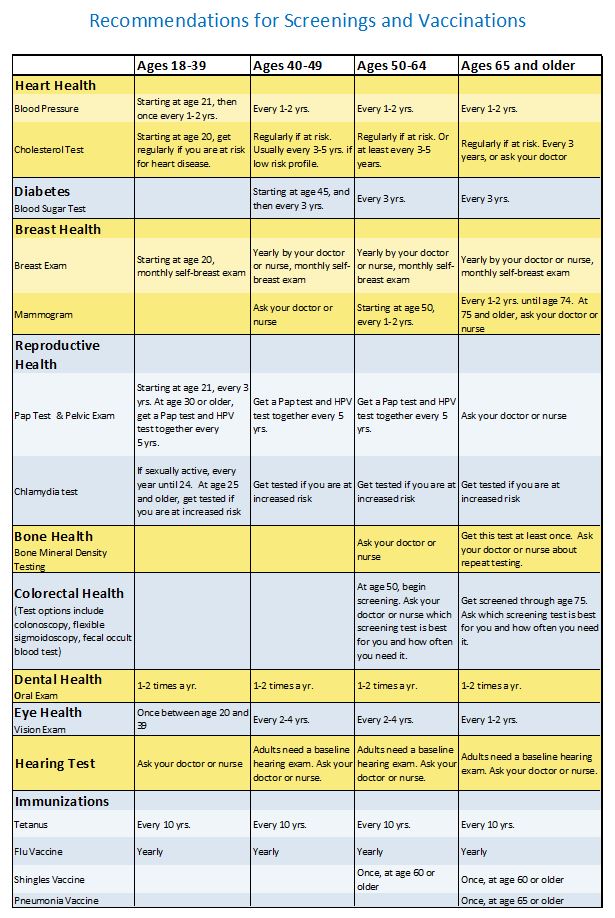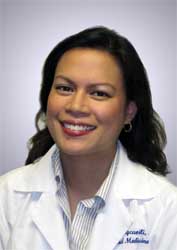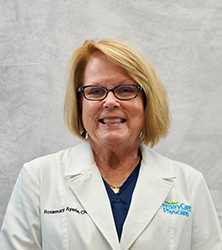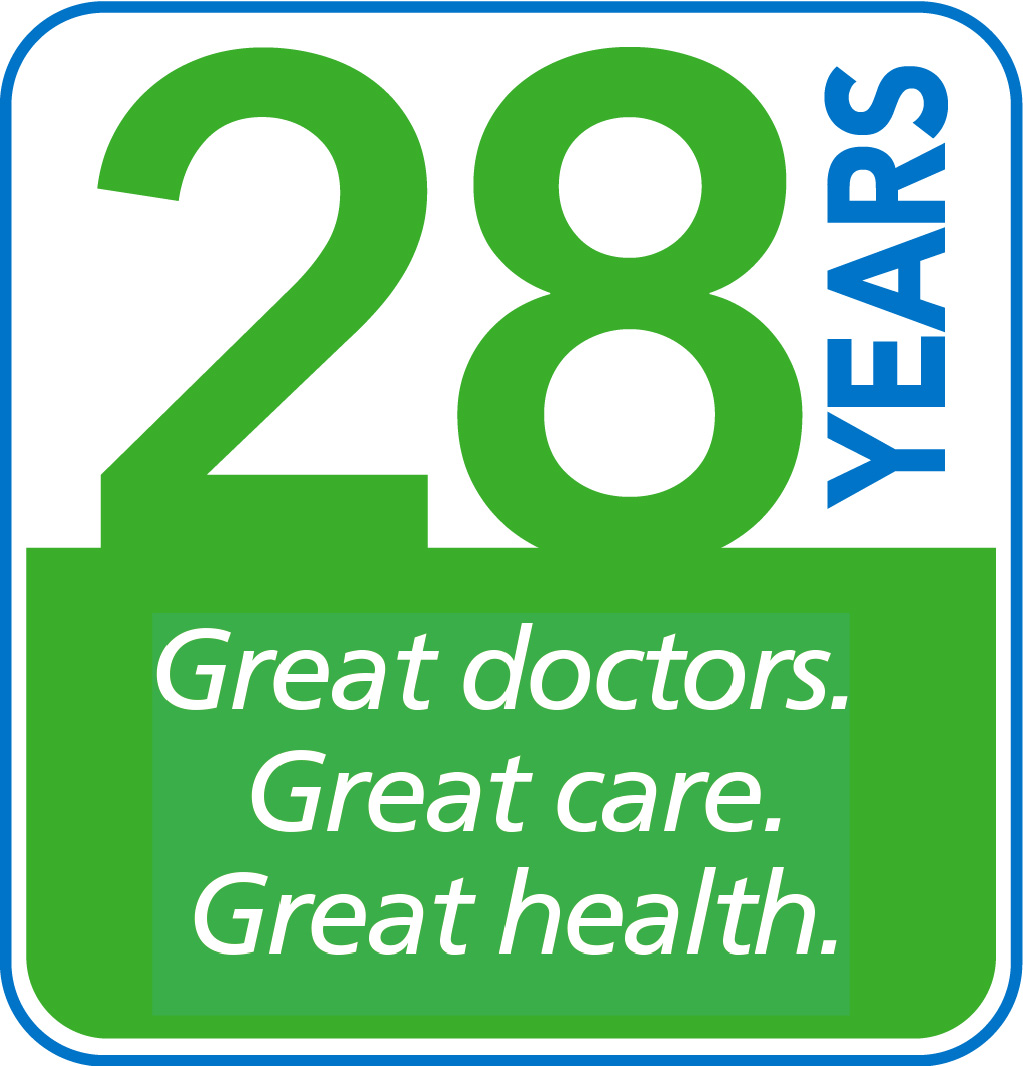– Key tips for his 30s-70s
We first thought of this article as a “Men’s Guide to Good Health.” But, as primary care doctors we know that many of our male patients would never even see us for a check-up if it weren’t for their wives, mothers or girlfriends. “Men notoriously underestimate their level of disease risk or sickness,” says MPCP physician, Dr. Garth Ashbeck. “They tend to ignore scheduling regular health exams, perhaps because they’re not as used to seeing the doctor on a regular basis as are women. However, it is through those regular check-ups and screenings that we can catch health problems early, often when they’re most treatable,” he adds.
That’s why we’re directing these health tips to women, (but we hope you men will read on…..)
In his 30’s– Men at this age should see the doctor for a baseline check-up and then at least every other year until age 40. A baseline gives the doctor a picture of where your health is now, and some important information about blood pressure, weight, disease risk and family history. Some guys don’t know their family history, so try to find out if cardiovascular disease, cancer, diabetes or other disease runs in the family. While most screenings are done in a man’s 40s, some may need to be done early if he’s at high-risk. “Establishing a good relationship with a doctor early helps form a partnership in keeping the patient healthier throughout their life,” says Dr. Jonathan Forman of MPCP, “The focus can be on prevention versus treating disease after it’s already arisen.”
In his 40s– Men may start to feel their age more in their 40s, particularly if they’ve been ignoring their health up to now. “Often the 40s are the decade where men begin to see weight gain, high blood pressure or other problems creep up,” says Dr. Forman. The good news is that it’s a great time to turn your health around. Key screenings that should be done in men’s 40’s are for: high blood pressure, cholesterol levels, blood glucose for diabetes, PSA (prostate-specific antigen), and a skin cancer check. Dr. Ashbeck adds that staying active is crucial in this decade and beyond. “Many men have hectic work and family lives, but regular exercise is a key to staying heart healthy, keeping the weight off, and reducing stress,” he notes.
In his 50’s– The main screening to add at age 50 (for men & women) is for colorectal cancer. Men should also see an ophthalmologist for an eye exam to detect early signs for glaucoma or other vision issues. “This is a time to tell your man not to ignore any warning signs,” says Dr. Forman. “What might seem to be indigestion, can actually be early signs of a heart attack, or those frequent trips to the bathroom at night might indicate an enlarged prostate.” By now men should be getting a full yearly work-up that includes blood tests to check cholesterol and triglyceride levels. Some doctors may even suggest an echocardiogram or stress test if there are any cardiovascular disease symptoms.
In his 60s & Beyond– Research shows that people in their 60s and 70s are markedly happier than at other points in their lives. “If men have stayed on top of their health, these decades are usually very active and rewarding,” says Dr. Ashbeck. “Also, since it’s never too late to get healthier, proper diet, exercise and staying engaged socially are important habits to maintain.” Mixing in some strength training with regular aerobic exercise will help- remember senior does not mean sedentary. Men should also feel comfortable talking to their doctor about sexual function and health “below the belt.” Keeping on top of vision and hearing screenings is also important to staying active and social. Talk with your doctor about other important screenings, vitamin supplements, and recommended vaccinations, including an annual flu shot.
 Dr. Jonathan Forman, an MPCP partner who practices in our Glen Burnie office, is certified by the American Board of Family Medicine. He received his medical degree from Temple University School of Medicine and completed a residency program in Family Practice at University of Maryland Medical Center.
Dr. Jonathan Forman, an MPCP partner who practices in our Glen Burnie office, is certified by the American Board of Family Medicine. He received his medical degree from Temple University School of Medicine and completed a residency program in Family Practice at University of Maryland Medical Center. Dr. Garth Ashbeck is also an MPCP partner and he practices in the Pasadena office. Certified by the American Board of Family Medicine, he received his medical degree from Georgetown University School of Medicine and completed a residency in Family Practice at Memorial Medical Center.
Dr. Garth Ashbeck is also an MPCP partner and he practices in the Pasadena office. Certified by the American Board of Family Medicine, he received his medical degree from Georgetown University School of Medicine and completed a residency in Family Practice at Memorial Medical Center.


 Dr. Agcaoili is a Maryland Primary Care Physicians, LLC partner and is certified by the American Board of Internal Medicine. She received her medical degree from the University of Pittsburgh School of Medicine in 2007 and completed her residency program in Internal Medicine at the University of Maryland Medical Center in 2010.
Dr. Agcaoili is a Maryland Primary Care Physicians, LLC partner and is certified by the American Board of Internal Medicine. She received her medical degree from the University of Pittsburgh School of Medicine in 2007 and completed her residency program in Internal Medicine at the University of Maryland Medical Center in 2010. Rosemary Ayerle, Certified Registered Nurse Practitioner, joined Maryland Primary Care Physicians, LLC in 1997. She received her Bachelor of Science in Nursing degree in 1982 and her Master of Science in Nursing degree from the University Of Maryland School of Nursing in 1989. Ms. Ayerle is board certified by the American Nurses Credentialing Center in Adult Practice.
Rosemary Ayerle, Certified Registered Nurse Practitioner, joined Maryland Primary Care Physicians, LLC in 1997. She received her Bachelor of Science in Nursing degree in 1982 and her Master of Science in Nursing degree from the University Of Maryland School of Nursing in 1989. Ms. Ayerle is board certified by the American Nurses Credentialing Center in Adult Practice.





